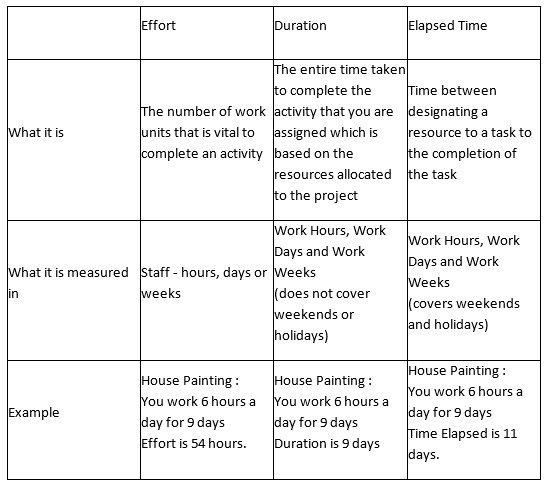
Effort Vs Duration Vs Elapsed Time: What are the Differences?
Last updated on 15th Jul 2020, Blog, General
Project Effort, Duration, and Elapsed Time
There is a lot of confusion about different time management terms. I am always asked questions about project duration, effort and elapsed time during my training classes.
Let’s take an example. What would you understand if I say, “Activity Alpha would need 3 days for completion”.This statement can be confusing without the proper context. ‘Days’ could mean one person working for 3 days. Or, it could mean the entire team working for 3 days. It can also mean 3 days for completion including non-working time and holidays.
I think the main cause of this confusion is our day to day conversations. We use time units like days & weeks and time management terms like effort & duration interchangeably in our daily conversations.
Definitions & Meaning
- Effort refers to the amount of exertion or the amount of work done to complete a task.
- Duration refers to the length of time or the time taken to complete a task.
- Elapsed time is the total amount of time that passes between start of an activity and end of the activity.
- These project management terms have completely different meanings. One term should not be used in place of the other. Let us explore these terms further with the help of an example.
Project Effort
Effort is the number of labor units required to complete a Task.Again, a task could mean an entire project or a WBS component or an activity. The effort is sometimes expressed in hours, days, or weeks but it is better to use person-hours, person-days, or person weeks in order to avoid any confusion. Some Project Management authors prefer to use ‘man’ or ‘staff’ as prefixes to express effort e.g. man-hours, staff days, staff weeks, etc.You can also look at Max Wideman’s Glossary for some other definitions of effort.
Project Duration
Duration is teh total number of work periods required to complete a task. A task could mean an entire project or a WBS component or an activity. Duration does not include holidays and non-working periods. Duration is usually measured & expressed in hours, days, or weeks but it is better to express it in work hours, workdays or workweeks in order to avoid any confusion.
You can also look at Max Wideman’s Glossary for some other definitions of duration.
Elapsed Time
- Elapsed time is the total calendar time needed to complete a task. It includes weekends, holidays, vacations and breaks.
- Again, a task could mean an entire project or a WBS component or an activity. Elapsed time is usually expressed in hours, days, or weeks, which is appropriate..
Example- you work on a construction project for eight days. You work from Monday to the next Wednesday. There is a Saturday and Sunday in between. Your elapsed time is ten days since the holidays are also counted.
Effort, Duration and Elapsed Time constitute a small part of the Time Management/ Scheduling Module and questions may or may not be asked on them but for future use, it is recommended that you study them well since they will be very important and useful in managing projects.

Example of Project Duration, Effort, and Elapsed Time
Let us consider a small task that involves painting one large wall.
Assumptions & Estimates
- 1 work day = 8 work hours. It means that a painter(s) will work 8 hours per Day.
- The painting task has a Duration Estimate of 4 work days with only 1 painter working.
- There is no scarcity of painters. There are enough painters available to do the task.
- All painters have equal productivity. The amount and quality of the work is the same for each painter.
- The task will start on Friday.
- Saturday and Sunday are holidays.
Duration
- If 1 painter works, the duration of the task would be 4 work days or 32 work hours.
- If 2 Painters work, the duration of the task would be 2 work days or 16 work hours.
- If 4 painters work, the duration of the task would be 1 work day or 8 work hours.
Elapsed Time
- If 1 painter works, the task will start on Friday and finish on Wednesday. The elapsed time would be 6 days.
- If 2 Painters work, the task will start on Friday and finish on Monday. The elapsed time would be 4 days.
- If 4 painters work, the task will start and finish on Friday. The elapsed time would be 1 days.
Effort
- If 1 painter works, the effort for the task would be 4 person days or 32 person hours.
- If 2 painters work, the effort for the task will remain the same – 4 person days or 32 person hours.
- If 4 painters work, the effort for the task will still be the same – 4 person days or 32 person hours.
Work
Work is synonymous with effort. MS Project uses the term ‘work’ for doing calculations related to effort.
Project Effort and Duration Formula
Let us continue from the above example. The relationship between project effort and duration can be best expressed by the following formula:
(Effort) = (Duration) * (Number of Resources)
This formula will not work in all cases but it gives a fair idea of the relationship. This formula will work only if:
- Work can be easily distributed among many resources.
- There is no dependency between the resources for doing the work.
- The productivity of all resources is considered equal.